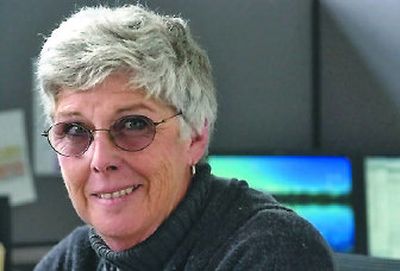Development chief moving on

The multitasking Texan who pens development regulations, supervises the Planning Department, reviews floodplain permits then spends her evenings advising the City Council and the Planning Commission is departing Spokane Valley for a private sector job. “This was an adventure, and I figure you only have so many adventures in life,” said Marina Sukup, 59, who moved here in 2003 to serve as the city’s first community development director.
As the framework of city government was placed on top of an unincorporated suburb of 80,000, Sukup oversaw the formation of its first comprehensive plan, the regulationsto enforce it and the leg work for some of the most high-profile legislation the elected leaders have handled so far.
“What we needed was a core of seasoned professionals that could come in and work with the city, particularly with the extra requirement of designing and building programs and services,” said City Manager Dave Mercier, who assembled experts from five states to run the city’s departments.
The city manager likes to compare the first days in the city’s Planning Department to living in a house that was under construction. Unlike newly formed cities that place a moratorium on new building for six or 12 months after incorporation, Spokane Valley started processing building permits immediately. Sukup came into the operation after long career in city government in Texas, where she is returning to work at the Knudson and Associates urban design firm in Houston with one of her former colleagues.
“This was kind of an opportunity to come some place I’ve never been before,” Sukup said of her time in Spokane Valley, which will end June 22.
An ad in a trade journal for a position in a city with a clean slate in a state known for its growth management laws piqued her interest, so Sukup trekked to the Northwest for the latest in a long series adventures in new places.
Her mom met her Argentine father on a Latin American cruise, and Marina grew up in Buenos Aires and Washington, D.C.
She met husband – a geophysicist who still works in Houston – while earning her bachelor’s degree at the University of Nebraska.
They have six children, and Sukup’s early career earned a master’s in public administration and experience as a city manager in small Texas communities.
Her interests turned toward planning while she worked as the city administrator of Sugar Land, Texas, which had its offices in the garden shop of a hardware store.
She was also the clerk of the Planning Commission there and became fascinated with land use as the former company town saw 2,700 acres of farmland turned into one of the premier master-planned communities in what is now a booming Houston suburb.
“The roads in Sugar Land go where they do because I made them go that way,” she said.
After about five years there, she worked for the city of Houston and went to law school. She spent a couple of years as a lawyer in private practice, but said she got bored spending so much time hanging around the courthouse and took a job in charge of planning in Laredo, Texas.
Laredo has the nation’s largest inland port – about half of the metropolitan area is across the Rio Grande in Mexico. Planning involved not just two municipalities but two countries, she said, and trucks at river crossings can back up eight miles this side of the border.
“We had some really interesting issues,” Sukup said. “They were fun for me.”
One time, when doing a study to see how many trucks’ manifests actually represented the cargo they were carrying, Sukup said she was called to a Mexican-government owned panel van filled with unsecured explosives sitting in the 110-degree heat.
Eventually her career brought her to a project in Dallas and back to the Houston area before depositing her in Spokane Valley.
“She’s got some spunk,” said Gail Kogle, chairwoman of the Planning Commission.
Sukup cares deeply about her work, Kogle said, and put in long hours to make sure the decision makers had the information they needed to make a decision.
“Marina has great patience at explaining urban planning to people who don’t know much about it,” Kogle said.
Looking back, Sukup also has plenty of positive things to say about the city and the people running it, calling the Planning Commission the most dedicated she’s ever worked with.
She’s also honest about aspects of the city’s planning that haven’t worked so well, acknowledging that some planning processes have moved more slowly than many would like.
The bureaucratic and litigious nature of the state’s growth management regulations that she was eager to observe when she came here also left her underwhelmed.
“There’s a lot of lip service to citizen participation, but the citizens really aren’t empowered,” she said.
As far as issues specific to the city, Sukup points to her philosophy that design matters when it comes to building a community.
“Some of the housing we are building is not housing that will hold its value,” she said.
The city is currently rewriting the development code it inherited from Spokane County. During that process Sukup has consistently advocated for rules that encourage innovative building and make it less cumbersome for developers to improve the way they fill in smaller tracts with denser housing.
Challenges aside, Sukup’s consistent praise of the city’s staff, elected leaders and potential gives the impression that she feels Spokane Valley is on the right track and headed toward good things.
“This could be the garden spot, but it’s going to take a lot of courage, and it’s going to take awhile,” she said.